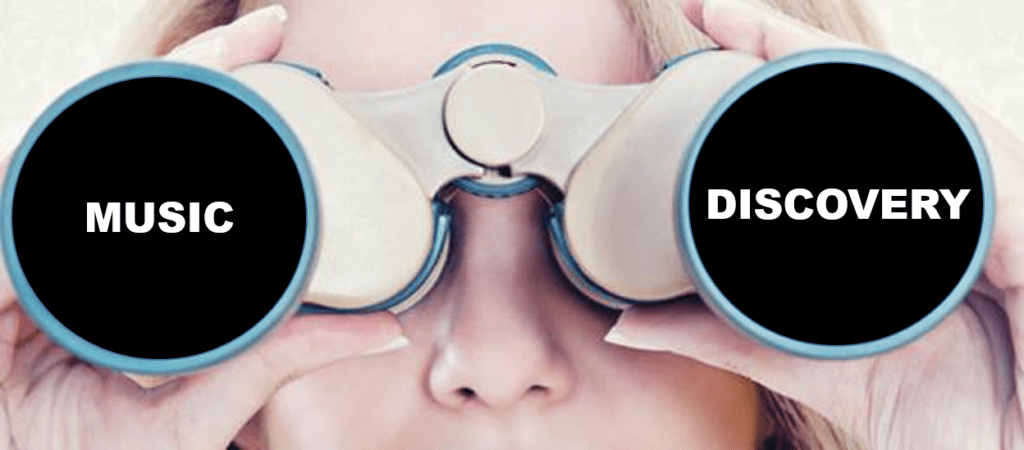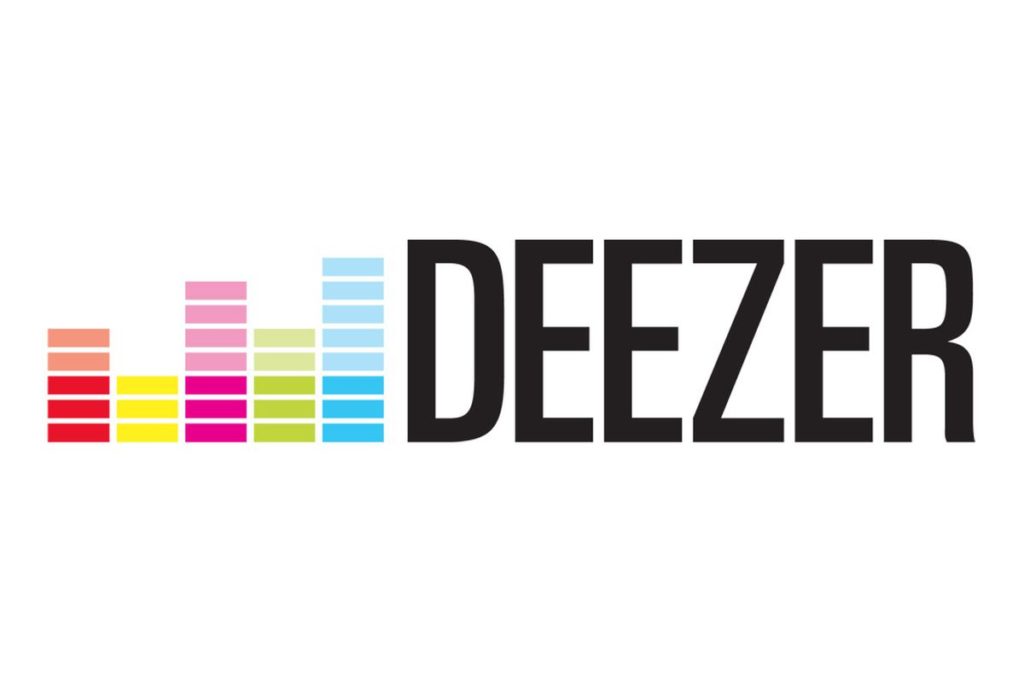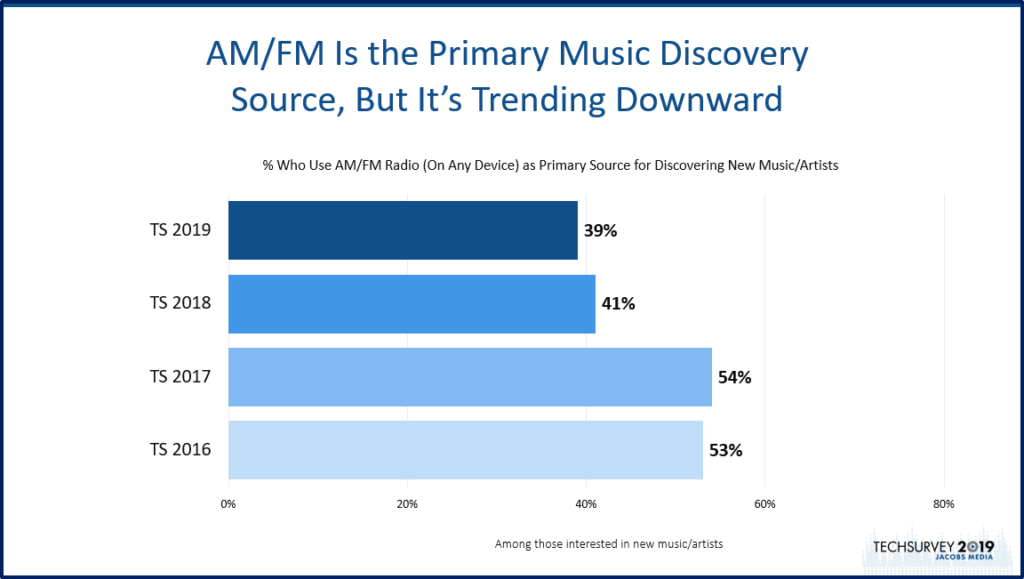
Believe it or not, I still have friends in the record label community, despite my lurid past as “The Classic Rock guy.”
And just about every conversation is another Kabuki dance about whether radio plays enough new music versus whether there’s any good music to play. It’s a chicken-egg thing. Stations are loath to play new music they don’t believe in. And labels won’t continue to discover, sign, and record artists that aren’t going to receive airplay.
Of course, I’m talking about the world of Rock music. With Country, Hip-hop, and other genres, it’s a totally different story as we saw the other night on the Grammy Awards show.
Like many rock programmers of a certain age, I vividly remember the days when we didn’t have enough current slots to accommodate all the great new music coming out. Scores and scores of artists had developed strong followings. The really good stuff by established groups had to get played – now. Cutting-edge stuff debuted at night or overnights. Everything else had to wait its turn.
The debut of a new album from Floyd, Journey, or AC/DC signaled their respective fan bases to come alive, often waiting in line at record stores to be among the first to buy it. The announcement of a new single by the Stones, U2, or Bob Seger actually helped stations “set occasions” that would have been powerful had PPM been around during those halcyon days of Album Oriented Rock radio – or as it was known as back then, AOR. As a PD, getting your hands on that new song – even a minute ahead of the competition – served as a little victory.
Back then, AOR excelled with 12-34 year-olds – the “sweept spot” of Baby Boomers. They were the target, long before the sweeping dictates of 25-54 buys clamped down on radio in the Eighties. They had money, interest, and enthusiasm for new music. And radio had their attention.
Obviously, this was a completely different universe than the Rock format finds itself in today. Everyone made a lot of money. And played a lot of new music because it was plentiful, and the audience demanded it.
Fast-forward to today. A research study conducted last year by Deezer, a streaming music company, reveals a condition they call “musical  paralysis.” That’s when consumers lose their interest in new music.
paralysis.” That’s when consumers lose their interest in new music.
Deezer interviewed 5,000 adults in the UK, the USA, Germany, France, and Brazil. And while the onset of “musical paralysis” varies considerably by country, the average fans hits the wall at around 28 years-old.
Covered in Digital Music News by Daniel Sanchez, the Deezer study shows that in America, most people’s peak music discovery period occurs when they’re 24½ years-old. But “paralysis” sets in around the time they reach they’re 30th birthday.
Interestingly, the top excuse for gravitating away from the new music scene is a lack of time, demanding jobs, and a sense of music overload.
Yet, there’s an important caveat. A majority of respondents – 60%, in fact – say they’d love to hear more new music if they just had more time.
So, where do consumers who have an interest in new music and new artists do their discovering?
Our Techsurveys tell an evolving story. Now, keep in mind that most respondents are radio listeners to begin with – mostly members of station email databases.
That said, there’s a pattern when we look back at the role broadcast radio plays in the discovery of new music. In our survey, radio is well ahead of other sources – satellite radio, streaming services, YouTube, and even friends and family. That’s the good news.
But its primacy over these other platforms is slipping. Just three years ago, a majority of Techsurvey respondents pointed to radio as their go-to source.
Here in our brand new, yet-to-be-released 2019 study, we see radio’s advantage is fading:

Part of the new music erosion radio may be experiencing could be emanating from the aging of the medium and its audience. And while no one is tracking this, chances are good that less new music is collectively being played since the dawn of the PPM Era.
But the Deezer study suggests something potentially interesting. If there was a way for a service, a platform, or a medium to efficiently expose audiences to new bands, new genres, and new releases – a clear, simple, and trustworthy curation process – you wonder whether there could be a “there there” for broadcast radio. Many stations also have credible personalities who can also provide much-needed guidance for the listening audience – new music Sherpas, if you will.
When it comes to “spins” and conventional exposure, many radio stations may not provide enough support to facilitate discovery. But given the growing on-demand nature of media consumption, broadcasters could be providing web and app tools and features that could make it seamless and easy for the harried, multi-tasking consumer to play catch-up with the new music scene.
It might also give radio brands a better chance to simply and inexpensively create web content that’s sticky, attractive, and marketable. The fact the Deezer points to lack of time, rather than lack of interest as the driver behind “musical paralysis” makes you wonder if the music industry world has slipped into the same type of jumbled overcrowded that has retarded podcasting’s growth.
Too much choice, too many sources, too many gadgets – and not enough time. Those are problems that someone really smart could solve.
Back when I was a programmer, you discovered new music from one or two local radio stations – and then you read about the artists in Rolling Stone. Today, discovery has become democratized – and that’s a good thing. But it has also become ubiquitous, scattered, and undependable, making the new music terrain overly abundant, confusing, and impossible for someone with a job, a family, or a life to navigate.
Radio performed a valuable service in the last century when American audiences coveted new music discovery.
Could it play a different – but very key role – in the new music environment today?
- What To Do If Your Radio Station Goes Through A Midlife Crisis - April 25, 2025
- A 2020 Lesson?It Could All Be Gone In A Flash - April 24, 2025
- How AI Can Give Radio Personalities More…PERSONALITY - April 23, 2025




“Musical paralysis.” Who wouldda thunk? New music, “exclusives”, heard firsts were all part of great radio stations (ok, not oldies/classics & N/T). Smart use of new added intrigue to the familiar. Too much unknown is like playing The Gong Show. We heard/played “Landslide” as a CBS Softrock hit before it was released twice as a single by Fleetwood Mac and covered by The Dixie Chicks. On This World Radio Day, let’s think and do Innovative Curation for success beyond RADIO 100.
Crazy, right? Thanks for the note, Clark. Amazing with all this technology that radio could still get back in this game.
Really true and with the current saturation, there is also the laziness of the filters to show new proposals that are effective beyond the formula musically established by the industry. ergo, we have lost the ability to be amazed and it is hard for us to properly assimilate something that sounds the same, but different. Although, a good song ‘really good’, is good and it hits us right where nothing has tickled us for a while. Thank you Jacob, for the perspective and the opportunity to express our opinion.
Rolando, appreciate the comment.
Can’t help but think of the story the legendary Shotgun Tom Kelly tells of when he got to world debut John Lennon’s “Imagine.” The song was delivered to KCBQ on an acetate record, and then carted up, labeled and brought to Shotgun. Shotgun looked at–and misread–the label, and then went on to debut Lennon’s classic as…”Imogene”!! Whatever became of that song??
Great story, Dave!
I’ve know Shotgun since the 70’s. I know the story. I also know that although he pronounced “Imagine” wrong, “Shotz” did it with a great deal of genuine enthusiasm.
As always!
A bit off topic, two of the biggest winners on the Grammys the other night, Kacie Musgraves and Brandi Carlile, sell a ton of records, sell out concerts. (Musgraves sells out shows in Europe) and they get little or no airplay. Radio is really missing the boat on these two talented women. Did you happen to see Carlile’s performance of her song “The Joke”? Even the rapper with tattoos on his face was mesmerized.
Robert, I was just about to make a similar comment. I fell in love with “The Joke” and Brandi Carlisle after hearing the song on the radio. But it was non-commercial radio—Philly’s WXPN specifically—that introduced me to both Carlisle and Musgraves, as well as many other artists.
I agree that people are looking for “a service, a platform, or a medium to efficiently expose audiences to new bands, new genres, and new releases – a clear, simple, and trustworthy curation process – you wonder whether there could be a “there there” for broadcast radio. Many stations also have credible personalities who can also provide much-needed guidance for the listening audience – new music Sherpas, if you will.”
I think non commercial radio does an excellent job of creating these “new music Sherpas.” Dan Reid at WXPN or Jody Denburg at KUTX are just a few examples.
Setting listening occasions for new music does seem perfect for the PPM world. Now we just have to figure out how to make this happen and, even more importantly for commercial radio, how to monetize it.
Margo, thanks for the note. No doubt about it – many public radio Triple A stations like XPN do a lot of the heavy new music lifting. And yes, the personalities often play an important role in the process.
Not a research expert here, but with diminishing resources for research- and a good dose of questionable music it seems that many “successful” stations are taking the safe route with classics, recurrents and a handful of new(er) songs. It’s nothing new really. In Pittsburgh 1985 our competition wouldn’t play a new song until it tested in their call out. Eventually they started playing nothing but well testing oldies-and they’re still #1.
It seems that back in the day there were “secret weapons” for programmers to find, program and claim “the best new music first”. Now there are more ways than ever to find new music- but someone in radio has to make that decision as to whether it’s right for their station.
I profess that many stations are being overseen by a regional person who might raise an eyebrow if a local station puts a song on because “it sounds good”.
A lot of classic artists are still releasing music -but is it being played? Would any station put a new Paul McCartney song into rotation? Would Lionel Richie make it on an urban station ? Not impossible but certainly less likely in the “safe” part of the century.
It seems like mass appeal is shrinking- because the masses are discovering different genres of music. Granted, they have a lot of avenues to discover their music -but there’s really very little new “mass appeal” music -songs that will entertain a wide psycho-or demographic.
Broadcasting has always thrived on finding a large, happy niche in a demographic and winning with it. Unless you’re a classic hits or news talker- in many markets the possibilities are limited. The big format buzz of the week is “The Breeze” -a softer format with very little if any new music. John Sebastian is out with his “Boomer” format aimed at 55. Is he going to program it with new music ?
It might be a good idea for the music industry to start with some of its own research and see what people want.
Yeah, I could go on and on. I’m older than most-and I still hear new music I like. I hear a lot I don’t!! But isn’t that the bottom line? People probably want to hear music they LIKE….and whether it’s new or old-if they like it, they’ll consume it. Won’t they? Next week you might ask where the successful “new” movies are. I’m just sayin’.
Good comments, Dave. Thakns for continuing this conversation. And now that you mention it, it’s been a while since I’ve heard a broadcast radio station say, “The beset new music first.” That, in and of itself, says a lot.
There hasn’t been any truly new popular music since Hip-Hop in the mid-1970s!
New music is developed on stage with immediate audience feedback. Music became a middle-class hobby with no pay available for young performers. Talent + experience is the key but the experience is seriously lacking today.
I suppose the good news is that there is a massive opportunity for someone who creates a new generation of performance venues.
Bob, I believe that’s right. But a lot of change and churn is going to have to play out. Thanks for the observations.
This is a lot to process but I feel privileged to learn from it. It’s interesting to read Fred’s write up, it’s incredible information, much of it honestly is bit scary coming from an artist point of view. I find that the comments are also very interesting and scary again to hear radio’s attitude towards new music. The existence of new music so tight, so squeezed into a box of a playlist and evaporating and depending on format, nonexistence.
I read in a comment regarding classic artist that create new music and don’t have the opportunity to expose their music anymore. Being from Detroit, I remember Bob Seger releasing new music and it had no where to go, where did it get played, on WYCD, a great country station. Bob is a worldwide rock star and he can’t get airplay of new material on a rock station in his hometown because that format does not exist for him anymore. I’ve actually lived it with Brownsville Station because when our new album Still Smokin was released in 2012 we had the same issue. We had nowhere to go with it in regards to radio and we LOVE radio.
I’m not a radio broadcasting person, but I admit, I’ve worked hard to be very close to the industry because I want to know how it works, why radio does what it does. I also find it tremendously and endlessly interesting and it helps me develop my strategy. At the same time, I’ve been lucky and I feel like I’ve made some really great friends in the industry and found many incredible people and I really enjoy talking to them. Not so sure they feel the same way (laughs) It’s just such a tough nut to crack for new music and I often asked myself, why am I doing this.
From my perspective, there’s so much more to talk about, it’s a seminar in itself. Fred this is a great piece, thank you for the information, I may have to read it a few more times.
Reading the post from your perspective, Billy – as a creative songwriter & player – had to be dispiriting and demoralizing. I sincerely feel bad we’re where we are. I was fortunate as a programmer that the only place people could hear new music was on the radio. And we spent a lot of time, money, research, and effort sweating out every “add.” The passing last week of Rosalie Trombley, the great music director that helped build CKLW, was a reminder of the power of the gatekeeper.
Then MTV came along – and the disruption started. There was another place to not only hear new music, but to SEE it. And here we are now, in a world where radio airplay is valuable, but it’s far from the only way to get music exposed. And radio ignoring young people only weakens its impact.
I believe that formats that curate music and focus on discovery could have success in some music corners. But it’s not 1980 anymore. I would love to see broadcasters use that “loser FM” in their cluster take the risk and make a commitment to new music. Given the lack of success of so many second Country, Classic Rock, and Hot AC stations, why not spring one of them lose to play some great new music?
Like the new Billy Craig single? 🙂